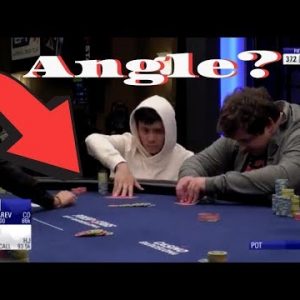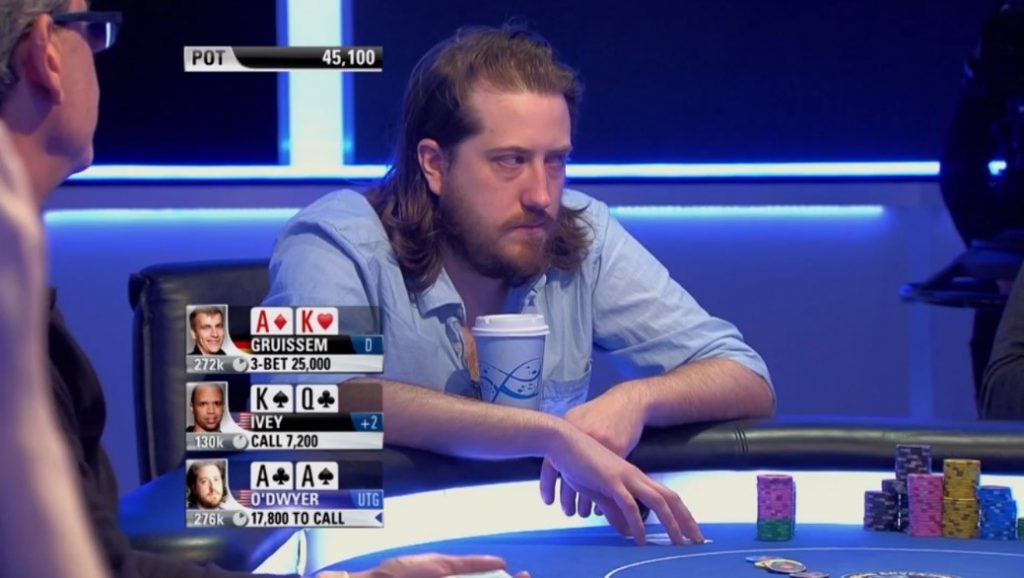Introduction to Angle Shooting in Poker

Have you ever heard someone say at the table that someone was “angle shooting?” When someone is shooting an angle, they are exploiting the rules in such a way to gain an unfair advantage. While it isn’t outright cheating, it is considered borderline and unethical. Today we will look at some examples of angle shooting.
Showdown Fakeout
One example of angle shooting that you will see sometimes at the river is what I call the showdown fakeout. It occurs when action is complete and a players calls out their hand without showing.
The opponent says something along the lines of “you’re good” and the person that called out their hand mucks. The “losing player” then shows their cards and claims the pot since they were the only person to show their cards.
This will instantly start an argument and is clearly unethical. However, there are many instances where a player has been awarded the pot because the other player mucked. Always show your cards at showdown. Some poker tournaments, such as the World Series of Poker, require that you show your cards at showdown to win a pot.
A similar instance of this one is when someone shows one card and the other person claims they are good. The person that showed one card mucks their hand expecting to get the pot. Then the other player shows their weaker hand and gets the pot. Always show your hand.
The Fake Check
Another type of angle shoot is a fake check. Someone makes an action that is construed as a check, such as a come here motion or something other than a rapping of the table or saying check.

If a player had his hand like this, is he checking or doing something else?
Then when it appears other players are checking, they said they wanted to bet. Some casinos are wise to this and will either penalize the player trying to angle shoot or tell them that their ambiguous action was a check.
Incomplete Bets
You will sometimes see players try and make incomplete bets trying to get a reaction out of a player. For example, a player in the big blind bets 1,000, and a middle position player puts out 1,400. The middle position player then claims that they just meant to call.
This is often done by a player trying to see how their opponent will react, and when they think they have the worst of it, they claim ignorance. Fortunately, many casinos are beginning to combat this, either by making the player keep the extra money in the pot or by penalizing them. If the extra amount is at least half the initial bet, they will be forced to raise.
Player Disconnected
Another type of angle shoot you will in online poker involves disconnecting. Many online poker sites have disconnect protection that will consider a disconnected player as “all-in” for the money they already have in the pot.
Sometimes you will see a player get disconnected in the middle of a hand and come back after enough time has elapsed to complete the hand. There are times that the player has disconnected intentionally with a hand that they do not want to commit a lot of money on but could catch. This way they have all the advantages of winning the pot but don’t have to commit more money to play the hand out.
This angle is more prevalent in cash games than in tournaments. In online poker tournaments, a disconnected player will be eventually timed out and their hand folded.
These are just a few examples of angle shooting in poker. Typically, a player that angle shoots will have a history of doing so and may even be pointed out. There have even been instances where tournament directors have called out certain players during the middle of a hand, warning that the player did the same thing in a different hand and what he had in that hand.
Angle shooting is heavily frowned upon and considered cheating by many. Once you get the reputation of being an angle shooter, your reputation will be destroyed and it is not worth the risk. Play the game the way it is meant to be played and you will always be welcome in the game.
